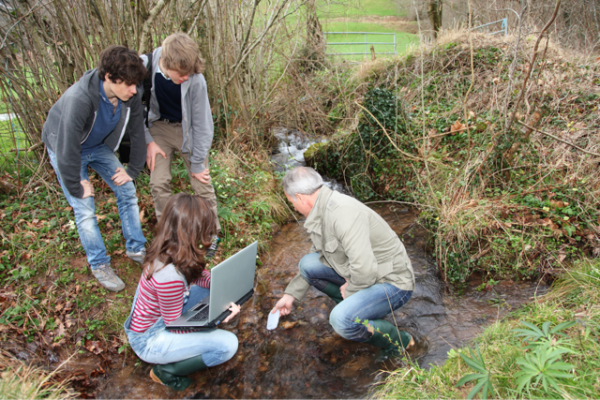
Espoo, Finland
Circular Economy
When:
04 August - 15 August 2025
Credits:
2 EC
Read more
Environmental Studies
When:
11 July - 22 July 2022
School:
Institution:
Spain Center for International Education
City:
Country:
Language:
English
Credits:
3 EC
Fee:
1199 EUR

UAM-SpaCIE’s Summer School “A Multidisciplinary Approach to Climate Change” (SSMACC) is a unique opportunity to broaden your horizons in one of the most beautiful and liveliest cities of the world, while studying at a top university. UAM oversees the academic aspects of the program and grants the diplomas and official transcripts, and SpaCIE recruits the students and oversees the logistics of the program.
The SSMACC is an exclusive 2-week study program that offers a high-quality multidisciplinary course, taught in English by top professors of many disciplines (Art, Biology, Business, Chemistry, Earth Sciences, Economics, Engineering, Geography, Humanities, Law, Marketing, Physics, Political Science, Psychology, and Sociology) and by top practitioners from the business world. The SSMACC brings together students from all over the World and a few local students in a truly international environment. The course is complemented by social and cultural events, as well as academic field trips.
The course contents (and the areas of knowledge or disciplines that each subject deals with) are the following:
1. What is Climate Change? Earth's Energy Balance and Greenhouse Gases (Physics, Earth Sciences, Chemistry)
2. Science Consensus: Why we know that we are to blame (Physics, Earth Sciences)
3. Feedbacks, tipping points, and future global climate (Physics, Earth Sciences)
4. Impacts on Physical Systems (Earth Sciences, Geography)
5. Consequences of Climate Change on Cities, Settlements and Key Infrastructure & Adaptation (Geography, Economics)
6. Consequences of Climate Change on Biological Systems & Adaptation (Biology, Earth Sciences)
7. Sociology of Climate Change (Sociology, Psychology)
8. Art and Climate Change (Art, Humanities)
9. Science Consensus and the Climate Change Debate (Interdisciplinary)
10. International Response to Climate Change (Political Science, Law, Economics)
11. Introduction to Climate Change Policy (Economics, Political Science, Law)
12. Mitigation Strategies (Engineering, Economics, Business)
13. From Mitigation Strategies to Policy (Economics, Political Science)
14. Climate Change and Business (Business, Finance)
15. Conclusions: The Transition to Net Zero by 2050 (Interdisciplinary)
Director: Prof. Dr. Miguel Buñuel
Undergraduate students in any field.
Bachelor’s degree graduates may also apply.
A good command of English language (minimum B2 level recommended) is a general requirement for all applicants.
A) Introduction
Climate change is the main global environmental problem and one of the main economic and social problems of Humanity. At least in the European Union, citizens' perception is also in line with scientific conclusions on the seriousness of the problem. According to the latest Eurobarometer survey published in 2019 by the European Commission, 93% of EU citizens believe that climate change is a serious problem and 79% that it is a very serious problem. Compared to the previous Eurobarometer, published in 2017, climate change has overtaken international terrorism as the second most serious problem facing mankind, after poverty, hunger, and lack of drinking water.
On the other hand, climate change is a multidimensional problem, which must be studied from all disciplines of knowledge. However, our curricula do not usually provide a multi- or interdisciplinary understanding of the problem and, although the population perceives it as a very serious problem, there is a notable lack of knowledge about its nature, effects, possible scenarios, policies, and responses to the challenge it poses for Humanity.
B) Objectives
In view of the shortcomings of our curricula and the lack of knowledge of a large part of the population mentioned in the introduction, the main objective of this course is to provide a multidisciplinary and rigorous view of the problem of climate change. The aim is for students to have a complete university-level vision, rigorously provided by experts in each subject, although adapted to the necessary introductory level given the heterogeneous profile that students will have, as it is generally the case throughout society.
In addition to the main objective described in the previous paragraph, the course has a secondary objective: providing an enriching “study abroad” experience, with all the benefits of academic, cultural and personal enrichment that this type of experience provides, but with the advantage that by intensifying the course in only two weeks it can encourage those who cannot live a longer experience due to its greater economic cost or do not dare to do so due to other factors.
Fee
1199 EUR, The Program cost includes: - Tuition fees for the course. - Cost of social and cultural events, as well as field trips included in the Program. IMPORTANT NOTE: Travel, room, and board costs are NOT included.
When:
11 July - 22 July 2022
School:
Institution:
Spain Center for International Education
Language:
English
Credits:
3 EC

Espoo, Finland
When:
04 August - 15 August 2025
Credits:
2 EC
Read more

Berlin, Germany
When:
01 September - 05 September 2025
Credits:
0 EC
Read more

Wageningen, Netherlands
When:
07 July - 18 July 2025
Credits:
0 EC
Read more